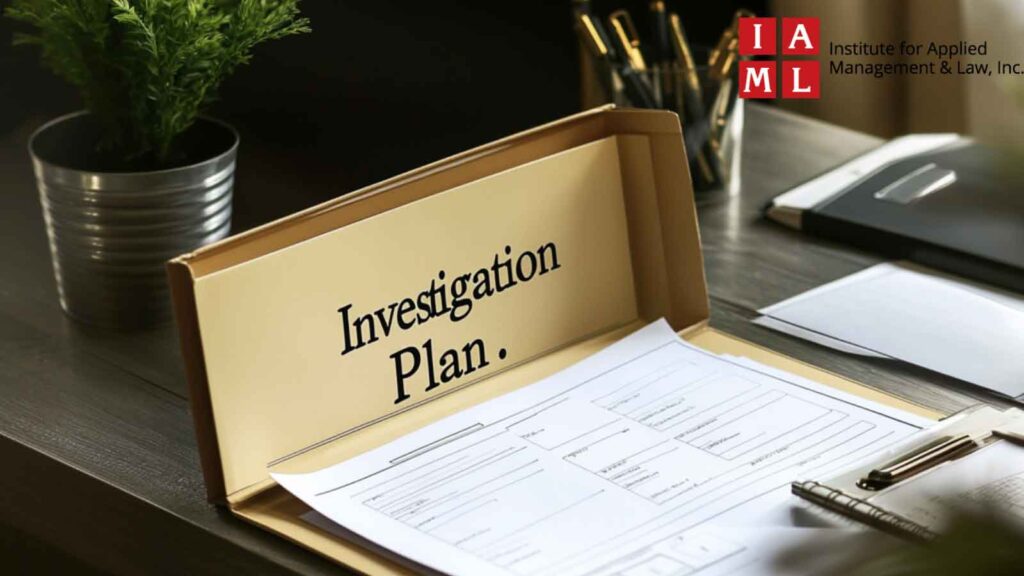
Employee complaints are an inevitable aspect of workplace dynamics in any organization. Handling such complaints with a structured approach is essential to maintaining a positive work environment and ensuring fair treatment for all parties involved.
Developing a comprehensive investigation plan is crucial for HR professionals to manage complaints effectively. HR certification programs emphasize the importance of having a well-defined strategy to address employee issues, highlighting that a clear and thorough plan can prevent misunderstandings and resolve conflicts more efficiently.
In this guide, we’ll walk through the essential steps to create an effective investigation plan, ensuring you can handle complaints with confidence and integrity.
Common Types of HR Complaints in the Workplace
Employee complaints in the workplace can arise from various sources, reflecting different aspects of organizational life. Issues may stem from interpersonal conflicts, perceived unfair treatment, or dissatisfaction with company policies.
Understanding the common complaint types is crucial for developing an effective investigation plan. By categorizing these complaints, HR professionals can tailor their responses and interventions to address specific concerns more effectively.
Here are some common types of HR complaints in the workplace:
- Discrimination: Employees complain of discrimination when they feel they are mistreated based on race, gender, age, religion, or other protected characteristics. This type of complaint often involves allegations of biased behavior or systemic inequality.
- Harassment: Harassment complaints involve unwanted, aggressive behavior that creates a hostile work environment. This complaint can include sexual harassment, bullying, or any conduct that intimidates or demeans an employee.
- Unfair Treatment: These complaints arise when employees believe they are being treated unfairly compared to their peers. This could involve inequitable work distribution, unequal pay, or favoritism in promotions.
- Violation of Company Policies: Complaints in this category relate to breaches of established company rules or procedures. Employees might report issues like improper handling of confidential information or failure to adhere to workplace safety regulations.
- Retaliation: Retaliation complaints occur when employees feel they have been punished for reporting concerns or participating in investigations. This might include harmful changes in job assignments, performance evaluations, or workplace relationships.
What Is an Investigation Plan and Why Is It Important?
An investigation plan is a structured approach to examining and resolving employee complaints within an organization. It outlines the procedures and steps necessary to address concerns effectively, ensuring that all aspects of the complaint are thoroughly examined.
A well-defined workplace investigation plan is essential for maintaining fairness, transparency, and compliance with legal and organizational standards. HR certification courses and programs emphasize the importance of such a plan, highlighting how it can lead to more consistent and equitable outcomes. Here are the critical steps involved in an investigation plan:
Identifying the Scope and Nature of the Complaint
The first step involves clearly defining the complaint’s scope and nature. This means understanding the issue, the context in which it arose, and its potential impact on the workplace. Identifying these elements helps determine the appropriate investigation approach and resources needed.
Establishing Investigation Objectives and Goals
Next, set specific objectives and goals for the investigation. This includes determining what you aim to achieve through the investigation, such as resolving the complaint, preventing future issues, or ensuring policy compliance. Clear objectives help guide the investigation and measure its success.
Assigning Roles and Responsibilities in the Investigation
Assigning roles and responsibilities ensures that the investigation is conducted efficiently and impartially. Designate team members to handle different aspects of the process, such as conducting interviews, gathering evidence, and analyzing findings. This clear division of labor helps in managing the investigation more effectively.
Gathering Evidence and Documenting Findings
Collecting evidence and documenting findings is crucial for supporting the investigation’s conclusions. This involves gathering relevant documents, records, and other materials that can provide insight into the complaint. Proper documentation ensures that the investigation is transparent and that decisions are based on factual information.
Conducting Interviews with Key Individuals
It is crucial to interview individuals involved in or affected by the complaint. This includes speaking with the complainant, the accused, and any witnesses. These interviews provide additional perspectives and information, helping to clarify the situation and identify any underlying issues.
Reporting and Implementing Investigation Outcomes
Finally, report the investigation’s outcomes and implement any necessary actions. This includes summarizing the findings, making recommendations for resolution, and taking steps to address the complaint. Effective reporting and implementation ensure that the issue is resolved and that similar problems are prevented in the future.
Benefits of a Well-Structured Investigation Plan
A well-structured investigation plan offers numerous advantages for managing employee complaints effectively. By implementing a clear and organized approach, HR professionals can ensure that issues are addressed promptly and fairly. The benefits of a well-structured plan extend beyond resolving individual complaints, contributing to overall workplace harmony and compliance.
1. Enhanced Fairness and Consistency
A structured investigation plan ensures that all complaints are handled consistently, reducing the risk of bias or favoritism. By following a set process, HR professionals can provide fair treatment to all parties involved, fostering trust and credibility within the organization.
2. Improved Efficiency
Clearly defined steps and responsibilities streamline the investigation process, making it more efficient. This helps resolve complaints more quickly, minimizes disruptions to the workplace, and allows for timely resolutions.
3. Comprehensive Evidence Collection
A well-organized plan guides the systematic collection of evidence, ensuring that all relevant information is gathered and documented. This thorough approach helps in making informed decisions and supports the investigation’s findings with concrete evidence.
4. Better Risk Management
By addressing complaints systematically, organizations can identify and mitigate potential risks early on. This proactive approach helps prevent minor issues from escalating into major problems, reducing the likelihood of legal disputes or reputational damage.
5. Increased Employee Confidence
A transparent and well-structured investigation process enhances employees’ confidence in the organization’s ability to handle complaints. Knowing that a reliable system in place encourages employees to report issues without fear of retaliation or unfair treatment.
Legal and Ethical Considerations in HR Investigations
Adhering to legal and ethical standards when conducting HR investigations is crucial to protecting the organization and its employees. Understanding and applying these considerations ensures that investigations are conducted fairly and legally, maintaining compliance with relevant laws and regulations.
- Confidentiality: Maintaining confidentiality is essential to protect the privacy of all parties involved in the investigation. Disclosing information prematurely or to unauthorized individuals can compromise the investigation and violate privacy rights.
- Impartiality: Investigators must remain impartial throughout the process, avoiding any biases that could affect the outcome. Ensuring an unbiased approach helps in achieving fair and objective results, which is critical for upholding ethical standards.
- Compliance with Laws: Adhering to relevant employment laws and regulations is necessary to ensure that the investigation complies with legal requirements. This includes following procedures for handling complaints, conducting interviews, and documenting findings.
- Protection Against Retaliation: Protecting individuals who report complaints or participate in investigations from retaliation is important. Ensuring that no adverse actions are taken against whistleblowers or witnesses helps maintain a safe and supportive work environment.
- Clear Communication: It is crucial to communicate clearly with all parties involved about the investigation process and its outcomes. Transparency helps in managing expectations and reinforces trust in the process, ensuring that all individuals understand their rights and the steps being taken.
How IAML Can Support Your HR Success
At IAML, we understand the complexities of handling HR complaints and the importance of a structured investigation plan. Our expertise in HR certification programs equips you with the knowledge and tools needed to manage complaints effectively and uphold organizational integrity. We provide specialized training and certification programs to ensure your HR team is equipped with the latest knowledge and best practices in fairness and compliance.
Connect with IAML and enroll in our training programs today to enhance your HR skills and ensure your organization operates with integrity and professionalism in every aspect of complaint management.


